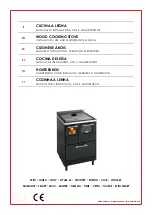
Page 11
Minimum 3 ½ (89mm) [4 (102mm) nominal] thick solid bricks are to be used. The fire clay liner
(ASTM C35 or equivalent), 5/8 (16mm) wall thickness, must not penetrate into the chimney beyond the
inner surface of the chimney flue liner and must be firmly cemented in place. If it is necessary to cut a
hole in the chimney liner, use extreme care to keep it from shattering. Refractory mortar must be used at
the junction with the chimney liner. After the assembly is complete, insert the chimney connector into
the fire clay liner. Do not push it beyond the inside edge of the chimney liner, as this will affect the draw
of the chimney.
B.
6 SOLID PACK CHIMNEY WITH METAL SUPPORTS AS A THIMBLE
: For the method of
installation to a masonry chimney shown in Figures 10 and 11, it will be necessary to purchase a 6
(152mm) inside diameter, 12 (305mm) long section of prefabricated listed solid pack chimney to use as
a thimble. Purchase a wall spacer, trim collar and wall band that are manufactured to fit the chimney
section you purchase. Cut out a 14 ½ (368mm) diameter opening in the wall. It may be necessary to
cut wall studs and install a header and sill frame to maintain the wall support. The hole in the chimney
must have at least a 6 (152mm) diameter fire clay liner or equivalent, secured with refractory mortar. If
it is necessary to cut a hole in the chimney liner, use extreme care to keep it from shattering.
The safety features of this system are the 2 (50mm) air space between the chimney section and
combustible wall, and the 1 (25mm) air space around the chimney connector as it passes through the
chimney section to the chimney. The location of the opening through the wall to the chimney must leave
a minimum 18 (457mm) vertical clearance between the connector pipe and the ceiling, to prevent the
ceiling from catching fire when using single wall pipe.
FIGURE 9
Page 18
OPERATING INSTRUCTIONS (cont.)
BLOWER OPERATING INSTRUCTIONS
(see blower installation instructions on page 24)
If your Quadra-Fire wood stove is equipped with an optional blower, you should follow these guidelines:
1. Initial (cold) start-up: Leave blower off until your stove is hot and a good coalbed is established. The blower may be
turned on approximately 30 minutes after loading the stove with fuel.
2. High burn setting: The blower may be left on throughout the burn.
3. Medium burn setting: The blower should be left off until a good burn is established, then turned on at a medium or
high rate.
4. Low burn setting: The blower tends to cool off the stove. If you are using wet wood or a very low burn setting,
leave blower off until the burn is well established. Then, if you wish, turn the blower on at a lower rate. Too high a
blower setting with a low burn rate may adversely affect emissions.
5. The blower is equipped with a speed control. The highest blower speed is obtained by turning the speed control on
and then adjusting back towards off as far as possible without turning the blower off. For a low blower speed, turn
the control knob clockwise as far as possible.
OPERATING TIPS
Here are a few tips on operating your Quadra-Fire stove to obtain maximum efficiency with lowest emissions:
1. Regardless of desired heat output, when loading stove, burn your Quadra-Fire with air control wide open for a
minimum of 15 minutes.
2. Regulate burn rate (heat output) by adjusting the air control rod (under ashcatcher).
3. Heat output settings: Following 15 minutes of burning with control wide open (see #1 above):
BTU/Hr.
Primary
Secondary
Below 10,000
Closed after 5 minutes
Pull to stop
10,000-15,000
Closed after 5 minutes
¾ - 1 open
15,000-30,000
Closed after 5 minutes
1 - 2½ open
Maximum heat
Full open
Full open
These are approximate settings, and will vary with type of wood or chimney draft.
4. Burn dry, well-seasoned wood (see section on wood selection and storage, page 19).
BURNING GUIDELINES
Aladdin Hearth Products, is deeply concerned with the air quality in your community. In order to maintain clean air, it is
very important to burn your wood stove in the most efficient manner possible. Following these guidelines will insure
environment-friendly operation.
OPACITY
This is the measure of how cleanly your stove is burning. Opacity is measured in percent; 100% opacity is when an
object is totally obscured by the smoke column from a chimney, and 0% opacity means that no smoke column can be
seen. As you become familiar with your stove, you should periodically check the opacity. This will allow you to know
how to burn your stove as nearly smoke-free as possible (goal of 0% opacity).
WOOD
Burn only dry seasoned wood. Store wood under cover, out of the rain and snow.
BURN RATES
HIGH:
Open (push in) air control rod fully. It is important to do this when reloading the stove. Failure to do this could
result in excessive emissions (opacity).
































